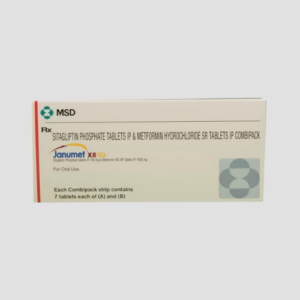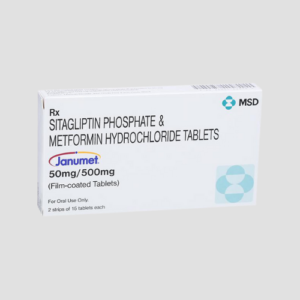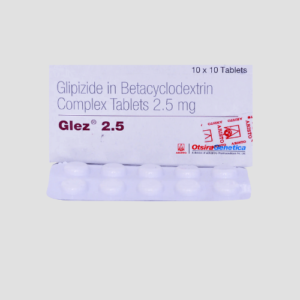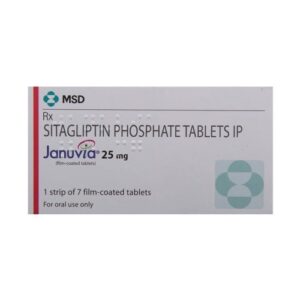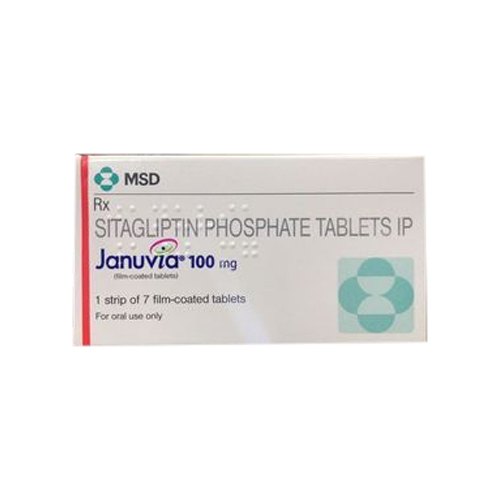
Brand Name – januvia 100
Generic Name – Sitagliptin 100mg
Packing Type – 7 Pills in one strip
Packing Size – 35, 70, 105, 210 (in pills)
Januvia 100 mg Tablet 7’s contains Sitagliptin which belongs to the class of dipeptidyl peptidase-4 (DPP-4) inhibitors used in the treatment of type 2 diabetes in adults. Januvia 100 mg Tablet 7’s is prescribed for the condition of type 2 diabetes when diet and exercise alone cannot control their blood sugar levels. It is the first-line therapy for patients with type 2 diabetes that restores the body’s response to insulin. Insulin is the hormone that controls sugar levels in your blood. People with type 2 diabetes either do not produce enough insulin or the insulin produced is unable to perform its function in the body (insulin resistance). Middle-aged or older individuals are most likely to suffer from type 2 diabetes, so it is also known as adult-onset diabetes.
Januvia 100 mg Tablet 7’s should not be used in patients with type 1 diabetes and for the treatment of diabetic ketoacidosis. Januvia 100 mg Tablet 7’s work by blocking the action of DPP-4 (an enzyme which destroys hormone ‘Incretin’). The enzyme ‘Incretins’ help to produce more insulin only when required and reduce blood sugar level produced by the liver when not needed.
Januvia 100 mg Tablet 7’s should be taken with food or empty stomach. However, it should be taken at the same time of the day each time for best results. For better advice, your doctor will decide, what dose should be taken and it can change timely depending upon your condition. The most common side effect of Januvia 100 mg Tablet 7’s are hypoglycaemia (low blood glucose levels), upper respiratory tract infection, nasopharyngitis (infection of nose and throat with common cold) and headache.
Januvia 100 mg Tablet 7’s should not be stopped even if you feel better, without consulting your doctor as sugar level keeps changing. If you stop taking Januvia 100 mg Tablet 7’s abruptly, it may increase your sugar levels which could further increase the risk of eyesight loss (retinopathy), kidney (nephropathy) and nerve damage (neuropathy). Januvia 100 mg Tablet 7’s should not be taken if you have severe kidney or liver disease. Please inform your doctor if you have any heart disease, is or planning to get pregnant or breastfeeding.
Prolonged intake of Januvia 100 mg Tablet 7’s may cause acute pancreatitis (swollen pancreas), and critical kidney problem. Increased risk of hypoglycaemia (low blood sugar level) can occur when Januvia 100 mg Tablet 7’s is added to other anti-diabetic agents or insulin therapy. In this case, your doctor may adjust the dose of Januvia 100 mg Tablet 7’s. Severe allergic reactions might occur in some patients taking Januvia 100 mg Tablet 7’s like anaphylaxis, angioedema (swelling under the skin), and exfoliative skin conditions including Stevens-Johnson syndrome. Safety and efficacy of Januvia 100 mg Tablet 7’s in children under 18 years have not been established, so it should not be given to them. Patient taking digoxin (a heart medicine) with Januvia 100 mg Tablet 7’s should be closely monitored as severe drug interaction has been observed.
Januvia 100 mg Tablet 7’s work by blocking the action of DPP-4 (an enzyme which destroys hormone ‘Incretin’). The enzyme ‘Incretins’ help to produce more insulin only when required and reduce blood sugar level produced by the liver when not needed. Thus, Januvia 100 mg Tablet 7’s plays a vital role in controlling blood sugar levels and prevents serious complications of diabetes like eyesight loss (retinopathy), kidney (nephropathy), nerve damage (neuropathy), diabetic foot ulcer and delayed wound healing.
Every medicine has some sort of side effects. In the beginning days of the treatment with Januvia 100 mg Tablet 7’s, you may suffer from hypoglycaemia (low blood glucose levels), upper respiratory tract infection, nasopharyngitis (infection of nose and throat with common cold) and headache. But these would be temporary and may be relieved after some time. However, if you still have discomfort speak with the doctor.
| Packing Size | 105 Pills, 210 Pills, 35 Pills, 70 Pills |
|---|
